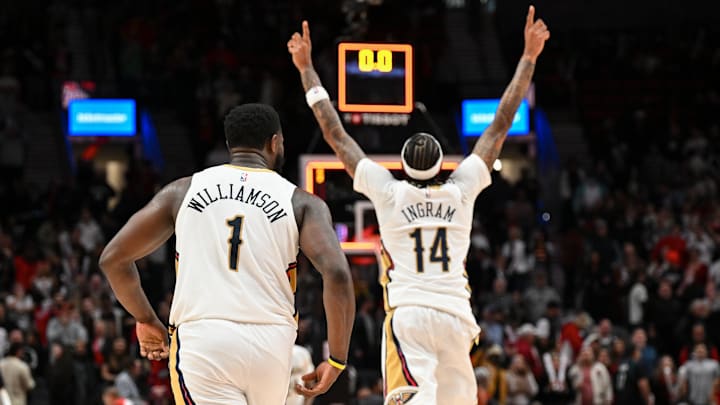The New Orleans Pelicans' roster has been dissected under a microscope all throughout the offseason, particularly their center rotation. With their only true fives being an aging career backup in Daniel Theis, a 20-year-old rookie in Yves Missi, and a former second-round pick turned free agent signing in Karlo Matkovic, that spot clearly wasn't up to par with the roster of their personnel.
Fans, analysts, and pundits pondered how the Pelicans and Head Coach Willie Green would tackle that problem, with many surmising that the center position would have to be addressed midseason via trade, myself included. Over the summer, though, Green gave a different answer: positionless basketball through small-ball lineups.
The thought of having Zion Williamson, an athletic marvel and walking mismatch, deployed as the only big man on the floor for the Pelicans has always been an exciting one, but sending out a small-ball unit to take advantage of a vulnerable opponent and being forced into playing small due to a lack of reliable center play are two entirely different scenarios. Green also gave a couple of questionable sound bites about New Orleans's potential small-ball lineups, stating that Herb Jones would be the de facto center a lot of times and that Zion won't be playing the five at all, which only made the Pelicans faithful more anxious about what was to come.
In their season opener, with Zion and Trey Murphy III sidelined, Coach Green opted not to go small at all, with Daniel Theis and Yves Missi splitting time at center until garbage time. It didn't take long for the Pelicans to debut their small-ball look, though, as Green rolled it out in their second game of the year against the Portland Trail Blazers, and the results were extremely encouraging.
Pelicans small-ball lineup led a comeback victory against the Trail Blazers
Zion missed the first game due to an illness and was clearly still under the weather against Portland. He was able to play but came out extremely rusty, as both he and the team got off to an atrocious offensive start in the first half. He wound up going into intermission with just four points on 1-7 shooting while the Pelicans only managed 37 points total and trailed by 10 at halftime.
New Orleans's offense corrected course in the second half, as they exceeded their halftime total in just the third quarter with 38 points. Unfortunately, they also allowed 37, leaving them with a nine-point deficit to overcome in the fourth. This uphill climb was only made more strenuous by Zion's minutes restriction in his first game back from illness.
Z brought the Pelicans all the way back before checking out with just under eight minutes left in the game after gaining the lead for the first time of the night. From there, it was a battle, with New Orleans expanding the gap a bit before the Blazers came storming back to knot the game at 99 a piece.
With just over three minutes left in the game, Coach Green sent Zion back in and subbed out Yves Missi, deploying his small-ball unit for the first time of the season with Z, Brandon Ingram, CJ McCollum, Herb Jones, and Jordan Hawkins closing it out. Blazers Head Coach Chauncey Billups called the Pelicans' bluff and left Deandre Ayton in. It didn't end well for Portland.
The Pelicans wound up winning the game, 105-103, allowing just four points in three minutes with their small-ball lineup, two of which came on free throws from Anfernee Simons after CJ McCollum committed a loose ball foul while the Blazers were in the bonus.
It wasn't perfect, but their small-ball unit was able to get the Pelicans the W and showed some encouraging signs to build off of moving forward. On offense, they were able to pull Ayton out of the paint with five-out spacing and got him into unfavorable actions that they were able to take advantage of. They also easily handled the Blazers' full-court pressure with multiple ball-handlers on the court.
On defense, they were able to neutralize and fluster Anfernee Simons by switching everything. Herb Jones did tag onto Ayton as the primary defender and did a fantastic job keeping the ball out of his hands, although it didn't look like that matchup was one that Portland was looking to attack anyway. They held their own on the boards, only allowing one offensive rebound which was an uncontrolled running tip from Toumani Camara that resulted in the Pelicans getting possession in the end.
The two final plays of the night really highlight the leverage that playing small can create for New Orleans. With the score tied at 103, the Pelicans have CJ set a screen for Ingram, forcing Simons to switch onto the ball-handler. With the rest of the team spacing the floor, Simons was left on an island against a player half a foot taller than him, and Ingram went to work, nailing a patented midrange turnaround over the smaller defender.
Going the other way, the Blazers run a play to try to spring Simons at halfcourt and get him going downhill with a head of steam. Ayton sets a screen at the meridian line that springs Simons, but Herb effortlessly switches onto him and shadows him the whole way. Herb ultimately forced Simons into a tough, contested lay-up that Herb was able to get his fingers on and Zion was able to ultimately swat away for good measure.
Eventually, the Pelicans will run into a matchup that can better expose their small-ball lineup's weaknesses. But, it seems like a lot of the initial concerns were overblown, and New Orleans has already found some ways to make the most of their advantages when going small.
